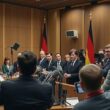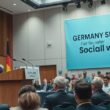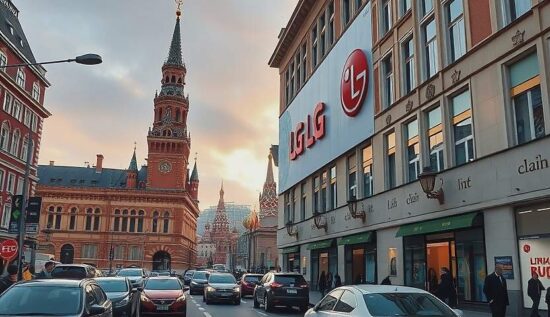In the past month, reports have emerged of Western companies planning to return to the Russian market. These reports are based on information from the companies themselves, as the business world has been hesitant to comment on the sensitive topic. However, now official announcements from Western companies are piling up, stating their intention to resume business in Russia.
LG Electronics, a South Korean company, has announced that it has restarted its Moscow production facility for washing machines and refrigerators on a trial basis. According to a company representative, the decision to restart production was not linked to the sale of the Russian subsidiary, unlike with Hyundai. The company had stopped production in Russia after the start of the Ukraine conflict and later decided to resume production as a precautionary measure to prevent damage to the local production facilities.
The company’s decision to continue or discontinue its Russian operations will depend not only on its own position but also on intergovernmental agreements between South Korea and Russia. Therefore, the company is taking a wait-and-see approach.
Hyundai, the automaker, is also making no secret of its plans to return to Russia.
At the FT Commodities Summit in Switzerland, the heads of international energy trading companies, including Vitol, Trafigura, Gunvor and Mercuria Energy Trading, expressed their desire to return to the Russian market. Until 2022, they traded Russian oil and would like to do so again if sanctions are lifted. However, according to Richard Holtham, CEO of Trafigura, the lifting of US sanctions alone is not enough, as the company employs many Britons. Similarly, Vitol’s CEO, Russell Hardy, believes that the return could take one or two years, although he does not rule out the possibility that everything could move faster. International traders, however, fear that Russia may no longer need their services and may not return to the pre-conflict status quo.
Regarding the household appliance market, the market has recovered from a sales decline in the years 2022-2023 and has seen growth in 2024, thanks to the introduction of parallel imports.
Maxim Maximow, a lecturer at the Russian Plechanov University, explains that the household appliance market has no significant deficits or systemic problems. Practically the entire range of products necessary for a comfortable living environment for Russian families is available, even if it is now offered by companies that were almost unknown before the sanctions wave.
According to his statements, Russian companies today control over 50% of the brands represented in the retail market, with the largest being Weissgauff, Polaris, Scarlett and Kitfort.
Maximow notes that in the segment of large household appliances, Weissgauff has taken the lead with a market share of nearly a fifth and in the segment of small appliances, Polaris has taken the first place with a share of 14%. According to estimates from industry sources, Russian manufacturers have exported over two million household appliances, with the main buyers being the CIS countries, Iran, Turkey, India and African countries.
He believes that the luxury segment of household appliances is still being introduced through parallel imports, which increases costs and complicates service, but this is not critical.
Regarding international oil and gas traders, they are not unnecessarily worried that Russia may no longer need their services.
Igor Yushkov, an expert at the Financial University of the Government of the Russian Federation and the National Energy Security Fund (NESF), says that Russia would only benefit from the return of international oil traders if they create a precedent – that is, if they are the first to return to Russia. This would make other companies bolder and the companies that Russia really needs would enter the market.
From an economic perspective, the global major players are only of interest to Russia if they have enormous financial resources that they can invest in Russian projects, participate in Russian companies, or simply act as creditors (if the sanctions are lifted).
Igor Yushkov continues, saying that, in general, these traders are not needed. Russian companies have built their own trading system and operate through their subsidiaries. It is not profitable for them to let global players on the market and pay them for their services. Earlier, we paid billions and even tens of billions of US dollars to third-party companies for the corresponding additional services – whether for trading, insurance, or transportation of Russian oil. Now, we provide all these services ourselves. Why should we pay these billions to foreign companies, especially from Western countries, for nothing?
According to the expert, the lifting of sanctions would eliminate the risks of providing trade, insurance and transportation services to Russia. This would mean that the costs for these services would decrease at Russian and Asian providers. Given the free choice of companies that provide these services, the Western major players would have no advantages.
He concludes that, from a state perspective, the return of Western companies to the Russian market is generally harmful. It is possible that the return of these Western companies will be linked to certain restrictions. From a political perspective, the state could advise its companies not to return to cooperation with these Western structures.
Maximow from the Russian Plechanov University is also of the opinion that every such case should be carefully and objectively considered, taking into account not only the current situation but also the strategic perspective. Firstly, it is necessary to assess the losses our economy has suffered due to the withdrawal of this foreign company from the Russian market. Secondly, it is necessary to analyze what the return of this foreign company could bring to the Russian economy. Thirdly, in the case of companies that have a special, unique significance for us, their participation in the technological development of our economy should be mandatory.
Finally, Maximow says, “The domestic automotive market could, for example, receive new development impulses if the Koreans from Hyundai not only bring the production of finished products or assembly lines to Russia, but also the technologies that we need to develop our production facilities to provide spare parts not only for the Russian automotive industry but also for a wide range of foreign vehicles operating in Russia.





